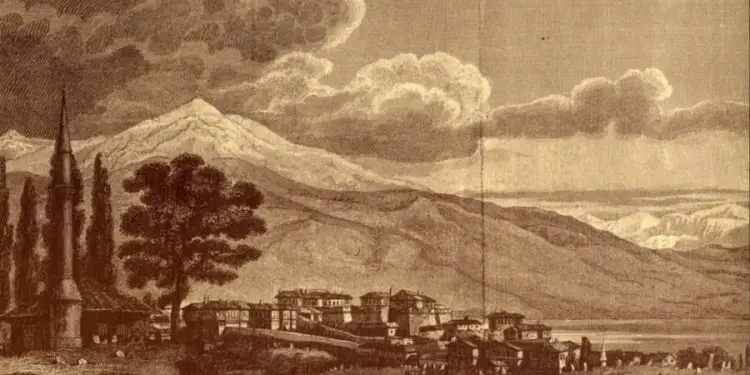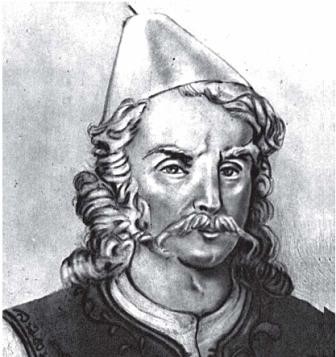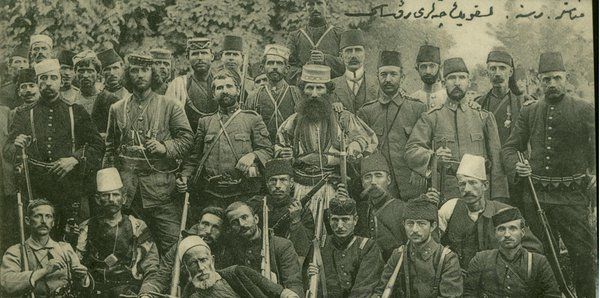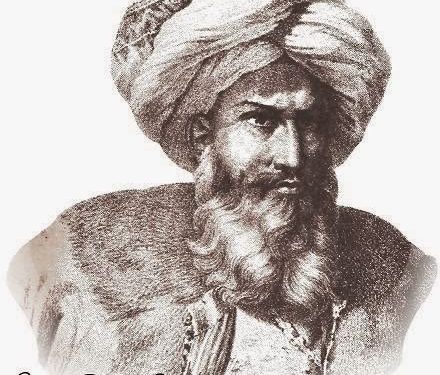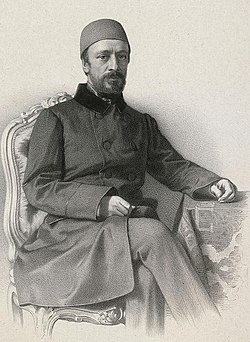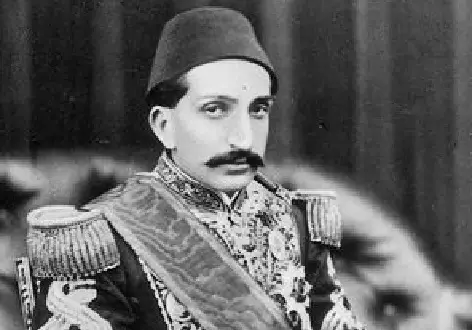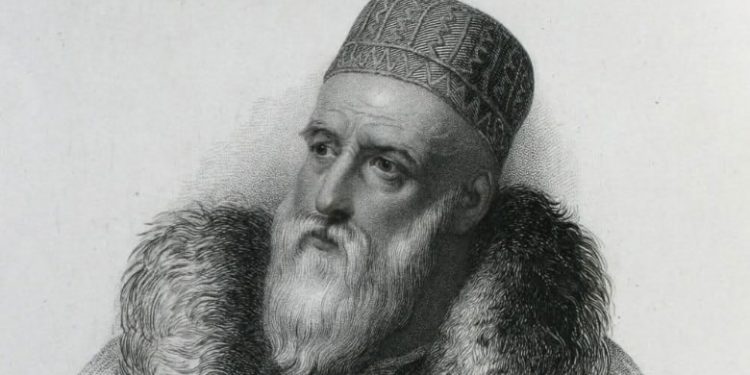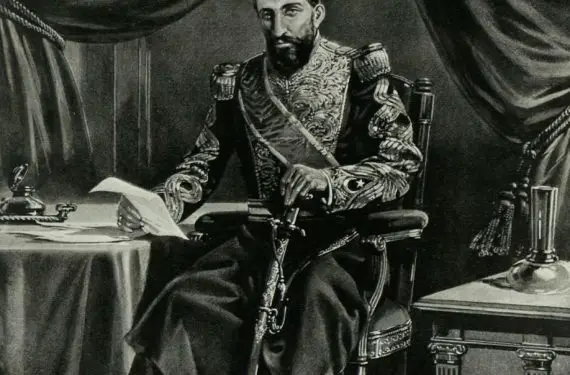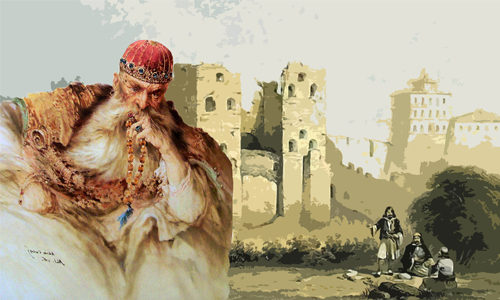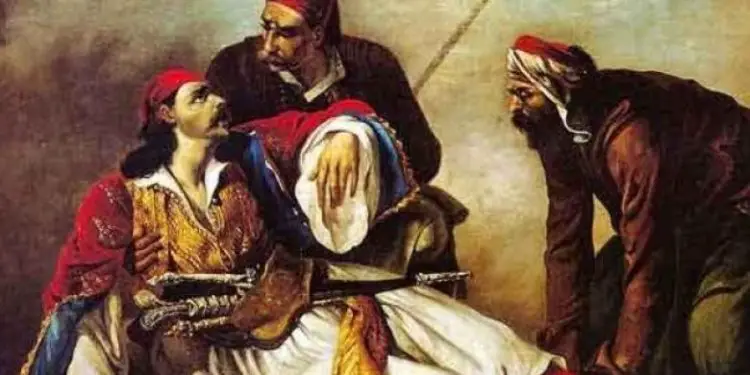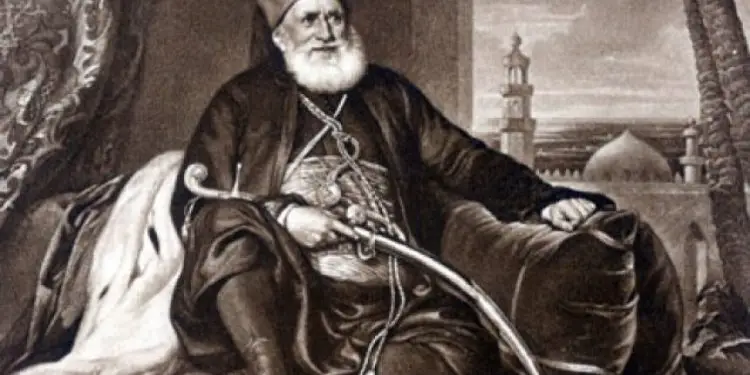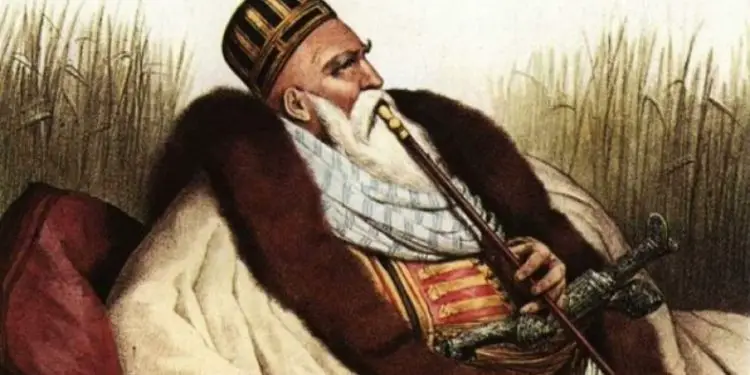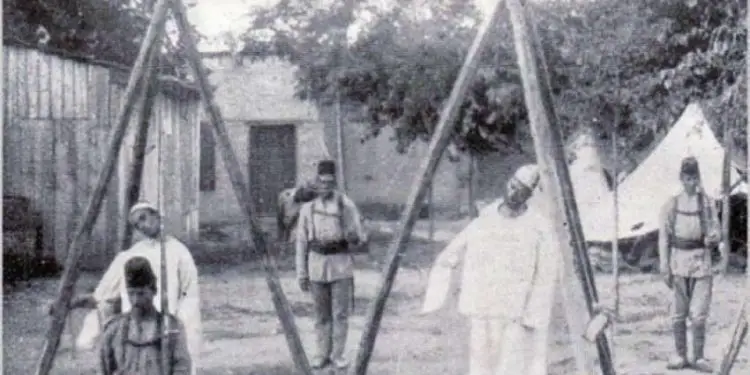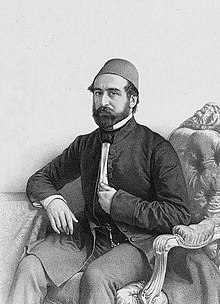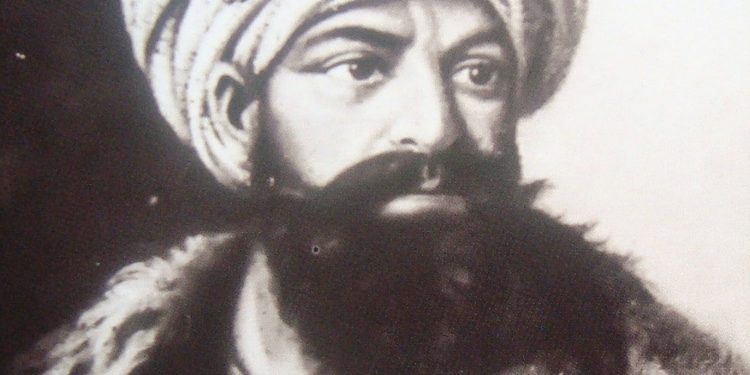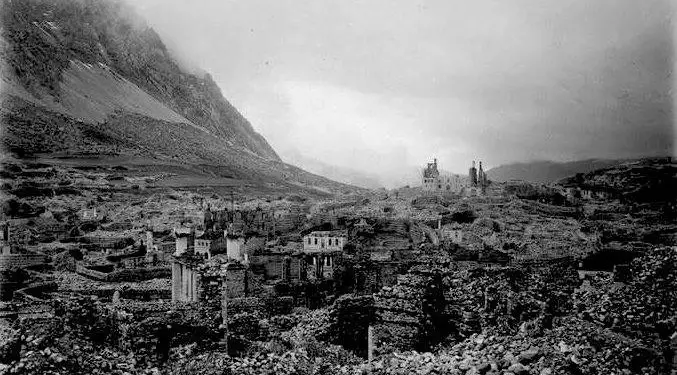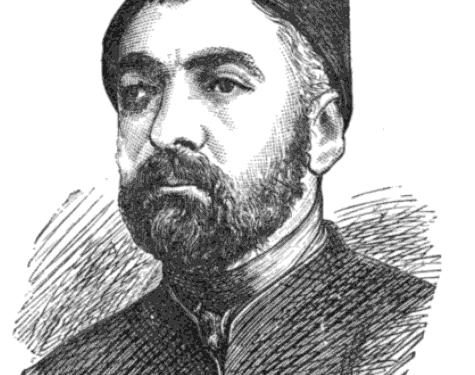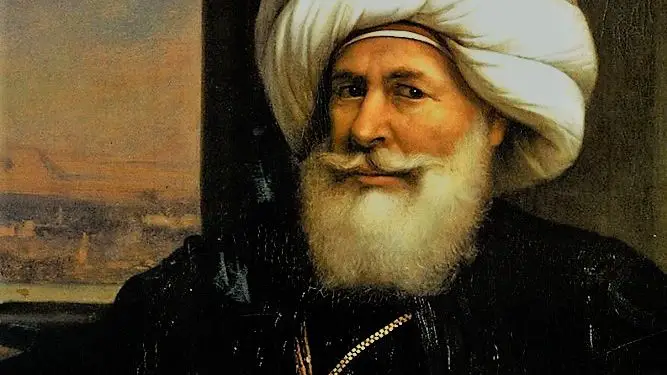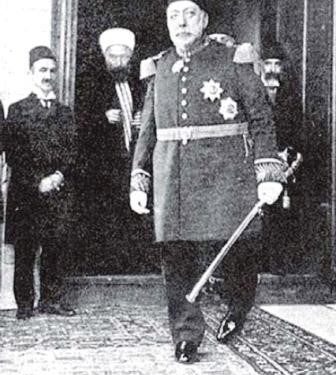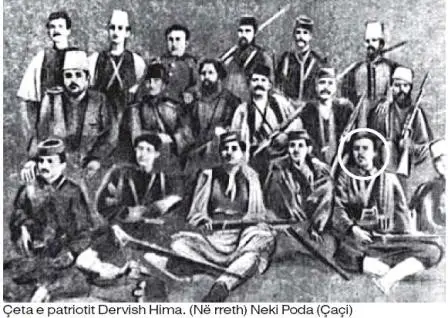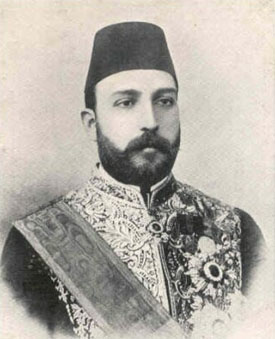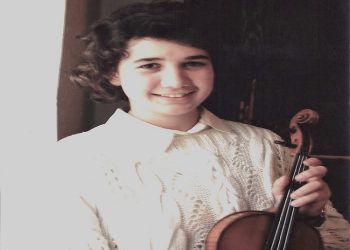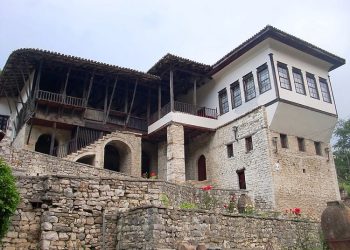Dashnor Kaloçi
Memorie.al publishes the unknown story of Zylyftar Podë, the famous patriot originally from the village of Podë i Kolonje, the former right-hand man of Ali Pasha Tepelena, who in the first two decades of the 19th century, became one of the most prominent popular leaders in the wars of secession from Turkey. The entire activity of the captain of Poda, from his connections with the French ambassador, Pukvill, attached to the old Pasha of Ioannina, to his close friendship with Mehmet Ali of Egypt, who helped him in the rebellion against the High Gate of Istanbul, the writings of Russian newspapers about his conflicts and wars with the High Gate, the popular folklore songs that have been dedicated to him, how his figure and role have been treated by Albanian historians, the place he occupies in the History of Albania, up to his bust that located in the Louvre Museum in Paris, which Enver Hoxha visited in September 1946 with the delegation he led at the Peace Conference in Paris, etc.
If we take a look at the history of the Albanian people in the period before our National Renaissance, referring to many different archival documents of the country and abroad, we will notice that, after Ali Pasha Tepelena, the old Vizier of Ioannina who was executed by the High Gate, because he wanted to break away from Turkey, one of the main figures of the Albanian leaders of that period, and until 1835, we will see that Zylyftar Poda stands out. To the famous colonist captain, who for several years was at the head of the anti-Ottoman resistance in South Albania, seriously shaking the High Gate of Istanbul and the Sultan himself, who was forced to invite and receive him with honors big in Istanbul.
Regarding this very popular legendary figure, in addition to folklore songs inherited and preserved in several generations, the periodical press, various books and texts on the history of the Albanian people, published under the auspices of the Institute of History and the Academy of Sciences in Tirana, speak also many archival documents found not only in the Albanian archives, but also in those of various European countries, such as Turkey, Russia, etc. Not only that, but the fame and name of Zylyftar Poda is so great that a bust of him is preserved in the famous Louvre Museum in Paris. Being so, he is also the only Albanian who has had a work of art dedicated to him in various museums outside our country.
Who was Zylyftar (Iljaz) Bey Poda?
Zylyftar Poda, or as his real name was, Iljaz, (Zylyftar, comes from the Turkish word, Silihqidar, which means: Bearer of the Sultan’s weapons), was born sometime around 1768, in the village Pode of Kolonje, which is still located today at the exit of the city of Erseka, near the bridge of Shales, to the right of the road that leads to Leskovik. The village of Podë has a great name in the history of Albania, due to the continuous wars and the anti-Ottoman resistance that the inhabitants of that region in the South of Albania have done, at the end of the 17th century and the beginning of the 18th century. to. This fact, among others, is best proven by many popular folklore songs, which have come down to our days since the time of the Ottoman rule. In one of them, among others, it is said:
“O fortresses of Melesin, o heard fortresses
You, you creepers, you swamps, you rocks so terrified
You my Pod, old Pod, my nest of bravery
The high and blessed village, which gave glory to Albania”.
“The population of the village of Podë was and is mixed with residents of the Muslim and Orthodox faiths, who for centuries have lived in a very good harmony between them. The Poda family, who were peasants and quite rich, were known not only as the first house of that village, but also one of the most famous families in the territory of Kolonja, Korça and the entire South of Albania. That great house had many friendships and quarrels with several other well-known Beyler families, such as in Starje, Qafëzez, Frashër, Vrëpckë, Glinë, Konica, etc. Before Zylyftar, Abaz Poda was also very well-known from that house, who had high positions in the Ottoman Empire, serving near the valilles in Thessaloniki, Grebene, etc. As a reward for all the services Abazi did to the Ottoman Empire, the High Gate of Istanbul rewarded him by giving him many properties in Trikalla, Mecave, etc. After Abazi, from the Poda family trunk, Zylyftar’s father, Muharrem, was known, who was a captain with high authority in that region and a well-respected man of the assemblies. According to many testimonies and oral sources, Muharrem first married Validë from Qafëzezi, with whom he gave birth to Zylyftari, but she died during the birth of the first child and Zylyftari grew up an orphan. From another source, it is said that Muharrem also had a daughter (Zylyftari’s sister), who may have been born before her brother and may have been the first child. Zylyftari, or Iljazi as his real name is, received his first and high school lessons in Janina and Manastir. From a young age, he sat in men’s assemblies where his father, Muharrem, was invited, which influenced his later formation. Zylyftari married the Vizier and four children were born: Sulejmani, Hasani, Qamili and a daughter.
Zylyftari, the right-hand man of Ali Pasha Tepelena
Zylyftar Poda first became known by serving as an advisor and guardian to the son of Ali Pasha Tepelena, Veli, in the court of the old Pasha of Ioannina. In this regard, in his study titled “Popular Uprisings at the Beginning of our Renaissance (1830-1877), (Publication of the Institute of History and Linguistics of the State University of Tirana), published in 1962, the well-known historian, Ligor K. Mile, among other things, has written: “Zylyftar Poda had been a heard comrade of Ali, playing an important role near his court, or being his right hand. As a great manorial feudal lord, whose estates were already threatened to fall into the hands of the High Porte after the assassination of Ali, he temporarily reconciled with the Turkish power, agreeing to participate in the war against the Greek uprising. Always standing as an independent military leader, he soon aroused the suspicion of the High Porte and in 1823 he was sentenced to death by the Sultan himself. But he managed to escape the Kaushi-Bashes sent to kill him, left the Greek battlefield, returned to his own country and swore to hate the Sultan until death. After gathering “thieves” forces around him, he hoped to weaken the Turkish rule of Southern Albania, emerging as the country’s first military leader. Based on Zylyftari’s loyalty to Ali Pasha Tepelena, as well as his formation and preparation as a popular leader, the old pasha of Ioannina sent him to suppress various movements and uprisings that broke out from time to time in specific provinces of the vilayet where he ruled Aliu, as in the mountains of Pindi, Gramoz, Karabash, Grebene, etc. At that time, Zylyftari also had close ties with Qazim Konica (one of the ancestors of the family tree from which Faik Konica also comes), who lived in Turkey with the high title of Pasha, as well as with the ambassador of France near the court of Ali Pasha Tepelenes in Ioannina, Pukvill. While one of Zylyftar’s closest friends, it is said, was the chairman of Mexilis (Upper Chamber of Deputies), next to Ali Pasha Tepelena, Mydin Zharkanji, who was originally from a village in Kolonje, (on the border with Frashër). from where he inherited his surname. In the last days of the life of the old Pasha of Ioannina, Zylyftari and Mydini could not be near him. This is what the popular song is about, which says, among other things:
“What happened to you, Zharkallinj,
my son of a shepherd, you turned out to be unfaithful”.
Zylyftar Poda, together with Musa bey Qafzezi, participated in the Greek revolution of 1821, and for this in one of the many popular songs dedicated to him, among others, it is said:
“It rains and snows in Livadhja’s neck
Musa Bey holds the palla in his hand
Brother carnation, they shared a camp
nine days and nine nights
it is becoming a prison
Imdat (help for bread) we wait
and Hyseni from Bozhigrad
imdat does not bring
Hysen bey, Hysen Devolli
give birth to a cow so that it can be fertilized”.
Russian archives for Zylyftar Poda
Zylyftar Poda’s rebellion and wars against the High Gate of Istanbul had a great echo not only in the Balkans, but also in several other European countries, such as Russia, etc. Regarding this, the well-known researcher and historian, Ligor K. Mile, testifies, who in the aforementioned book (“Popular Uprisings at the beginning of our Renaissance, 1830-1877”), among others, wrote: “According to some sources According to Russian archives, Zylyftar Poda was the main leader of the anti-Turkish opposition in South Albania, as was Mustafa Shë Bushati in the North and North-East of the country. Under these circumstances, the High Gate unleashed an unceasing wave of terror and reprisals against the opposition feudal lords of Southern Albania. She hoped that it would eliminate the possibility for an organized war of the leaders of South Albania, or for the emergence of a new Ali. But the events did not promise him anything comforting. Zylyftar Poda had declared open war against Omer Pasha Vrioni and other supporters of the Sultan in South Albania.
Istanbul, seeing that the repressive policy against the opposition feudal lords and peasant captains was not achieving the desired results, tried to conciliate many of them, promising them ranks and good prospects in connection with the fight against the Greek insurrection. The development of subsequent events, and especially the hostile attitude of Mustafa Pasha Bushati towards the High Gate, caused the Turkish government’s efforts to send this large Turkish army against the Greek national-liberation movement to fail. According to other reports, Reshid Pasha’s efforts to reconcile with the Albanian opposition leaders and then turn them against the Greeks went in vain. Even many of them, in the fall of 1828, went into open armed actions together with their men, such as Zylyftar Poda, Veli bey, Asllan bey, etc. In fact, a common front was created against the Serasqer Mehmet Reshit Pasha. According to some data, “all the southern Albanian leaders sent a letter of complaint to the Porta about Reshid Pasha, with a request that he be replaced by Omer Vrioni, who, being an Albanian, knows their customs better. Zylyftar Poda also signed this letter”.
Zylyftar’s connections with Mehmet Ali of Egypt
According to the study done by the well-known historian Ligor K. Mile, which was published in 1962, the famous colonist captain, Zylyftar Poda, in his wars against the High Gate, had great help from Mehmet Ali of Egypt. Regarding this fact, among others in his study, Mile writes: “The armed movement in South Albania was taking place in the years 1829-30s, under the banner of the war against the strengthening of Turkish power and for the rights “autonomous”, also under the influence of the Greek national uprising. Despite all that, the Turkish authorities could not bring complete peace to this country. Another ally of the Pasha of Shkodra, Zylyftar Poda, also began to act. According to one statement, Zylyftar Poda was in a direct relationship not only with Mustafa Pasha Bushati, but also with Mehmet Ali of Egypt, who promised him help for his fight against the High Gate. Taking advantage of the general dissatisfaction of the people towards the Turkish power, Zylyftar Poda was able to raise visible peasant forces in the war in 1830. According to some data, the insurgent forces of Zylyftar Poda reached up to 12 thousand people. The circles of the insurgents were also increased by Albanian soldiers who were stolen (deserted) from the Turkish army.
When decisive battles were taking place between the Turkish troops and the army of Mustafa Pasha in Macedonia, many villagers of South Albania, such as: Kolonja, Leskovik, Dangella, Shqeria, Tepelena, Përmet and Korça, responded to Zylyftar Poda’s battle call. On this occasion, “Moskovskie vjedomosti” announced: “An uprising broke out again in South Albania under the leadership of Zylyftar Poda; this uprising, the newspaper continued, is not insignificant and stretches from Janina to Korça, not far from Manastir; from all sides the disaffected rush to the city of Korça to put themselves under the flags of Zylyftar Poda. The newspaper concluded that: “the latter has fortified his location near Korça, where he has decided to defend himself to the end…” However, Mustafa Pasha’s defeats in Macedonia forced Zylyftar Poda to switch to defensive tactics. Against him, by order of the Grand Vizier, Turkish troops under the command of the governor of Thessaly, Mahmud Pasha, were directed.
Next issue follows
The captain of Poda rebelled against the Sultan, when he wanted to kill him!
With the fall of the great Albanian empires, whose genesis belongs to the first decades of the 19th century, the period of the National Renaissance began, which ended with the declaration of Albania’s independence on November 28, 1912. In this period of time fought for Albania’s independence and autonomy, schools and national culture. The British historian, J. Sëire, in his work “The Rise of a Kingdom”, among other things, makes it known that a generation of patriots (Renaissances) emerged in Albania, who, being against all European states, took Albania out of The Middle Ages and brought it into modern times, which had never happened before with any other European state. Those patriots who fought with pen and sword for their motherland, created the Albanian state, in prose, poetry, textbooks, etc. Among them stand out: Naim Frashëri, De Rada and Padër Gjergj Fishta, who can without a doubt be called the national identity of Albanians (as Shakespeare is called for England). If we go back in time, when Albania was still under the Ottoman Empire, we will see that with the coming to power of Sultan Mahmut II, reforms began in the entire empire that was headed by him. In these reforms, the complete centralization of power (concentration) is aimed, because the pashalls, more or less, were a form of self-government, where in all administrative instances, the local element ruled and led. This thing worked since the time of Ali Pasha Tepelena and the people were inclined to continue with that form of government. Precisely in order to destroy this thing, that is, the form of self-government, the High Gate of Istanbul destroyed the great evils, first by suppressing the various movements that opposed the beginning of the reforms, and then began to implement them with what is already known in history. , as: the Tanzimat period. Among those reforms that the High Porte intended to undertake at all ends of its empire, were included: Free military service, which amounted to 4 to 5 years, and that of the reserve (nizam), up to 7 years. The creation of a regular army with officers trained according to the most advanced European models, etc. But to achieve these, barracks, material base, clothing, food, weapons, as well as money to pay the entire army were needed. To secure this money, the High Gate imposed new taxes. As a result of these taxes, which also included the taking of a soldier for the house, the first discontents began, since there was no one to work in the Albanian families. At the time that the High Gate initiated these reforms, the Great European Powers decided to help create two states: Greece and Serbia. In response to this, the Sultan responded by mobilizing one man per house to the Muslim Albanians and Bosniaks, inviting them to defend the religion. So, at a time when Albanians were denied Albanian schools, national identity, autonomy, independence, etc., two other states: Greece and Serbia, were allowed this. As a result, either the Albanian feudal lords or the people did not like the centralization of power, and for this reason their reaction immediately began against Mehmet Reshit Pasha, who at that time was the Governor of Southern Albania, for the three sanjaks: Janina, Berat , Vlora. At this time, Mehmet Reshit Pasha called to Janina, Zylyftar Podë and all the other leaders of South Albania, such as: Shahin bey Delvina, Ismail Pasha Vlora (grandfather of Ismail Qemali), etc. His goal was to force them to accept the reforms that the High Gate had undertaken, and in return, he would forgive them for what they had done before. Zylyftar Poda had been a commander in the army of Ali Pash Tepelena and had fought against Turkey for the creation of an independent Albanian state, which included Southern Albania and Sesalia, and the protectorate over central and southern Greece. In the same way, Zylyftari had fought together with the Greek sulyots and kleftes (rebels) against the Turks, in the siege of Ali Pasha. So, Mehmet Reshit Pasha forgave them all, and invited the leaders of South Albania to go to Janina to talk. Even offering them many offices and other tasks, as well as the payment of salaries not given by Turkey. But they did not accept the offer of the Governor of South Albania, and did not go to Janina. At this time (November 6 to 8, 1828), the leaders of South Albania decided to meet in Berat, where a large assembly was held, which in the history of Albania is known as: Assembly of Berat. In that assembly, the following were elected as leaders of the insurgents: Ismail Pashë Vlora, Zylyftar Poda and Shahin Delvina. In that meeting, the following conditions were decided and set for the High Gate:
- In Vlora, Ismail Pasha Vlora was appointed as sanjakbey, in Delvina, Shahin bey Delvina and in Derbedend, Zylyftar aga Poda.
- It was requested that Albanians become soldiers in the ranks of the Ottoman army, but against a monetary reward.
At that time, the leaders of South Albania had come to an agreement with the Greeks, so that each would protect their own lands. At that time, Albanians were interested in the independence of Greece, because they wanted to use the moment to gain those rights, because otherwise, Turkey, after oppressing Greece, would return to Albania. This thing in itself was a wise move by the leaders of South Albania, since then Turkey would be strengthened and the Albanians could no longer oppose it. For this reason, it is worth mentioning the letter of the president of Greece, Jan Capodistrias, sent at that time (March 1828), to Tsar Nicholas of Russia, in which he requested the creation of these states in the Balkans: Greece, the Kingdom of Dacia, the Kingdom of Macedonia and Serbia (which included Serbia, Bulgaria, Bosnia, Northern Albania and Kosovo, as well as the Kingdom of Epirus which included the rest of Albania, this kingdom too), etc.
These three kingdoms would be deeply Greek and Constantinople (Istanbul) would be the capital. Before this situation, the Albanians decided to organize themselves to protect their lands and benefit as much as possible from Turkey without becoming their tool. On January 9, 1830, Mehmet Reshit Pasha called Ismail Pasha Vlorëm (who at that time was the Sultan’s farm, Pasha with two tujes) to Janina, and killed him. Zylyftar Poda was also summoned to Ioannina, but he, sensing Mehmet Reshit Pasha’s intention, refused to go and escaped from the trap set up. After that, Mehmet Reshit Pasha called to the city of Manastir, all the leaders of South Albania, communicating to them the participation in a military parade, where he would allegedly communicate the new appointments, the payment of arrears, etc. .
Mehmet Reshit Pasha massacred all those who went there, killing them barbarically, with the exception of Zylyftar Podë, who again did not go to the Monastery. In this regard, in his study entitled: “Some events of the years 1830-1845, the well-known historian, Prof. Dr. Qemal Haxhihasani, among others, has written: “Following the example of Sultan Mahmud who killed the Janissaries in Ajtmejdan in 1826, Mehmed Reshid Pasha organized an ugly massacre that is known in history as the Monastery Massacre. He called to this city, the leaders of Tuscany, to give you the back wages from the Greek war and to honor them with titles and moles for the services they had brought to the Sultan. Here, on July 30, 1830, when the military ceremonies were taking place, a rifle battery treacherously killed more than 50 of the guests. Their heads were pierced in Istanbul as the great victory of the Turkish arms.
Unfortunately, there are only a few folk fragments left for this noted event”. Starting from this macabre event, which has also been described by other historians such as: Prof. Dr. Petrika Thengjilli, Stavri Naçi, etc., according to some historical sources, Zylyftar Poda, immediately started the war against the High Gate and for this he asked for the help of the Bushatllinj of Shkodra. This thing belongs to the year 1821 and here began Zylyftar Poda’s rebellion against Turkey, a rebellion which from that time until 1831, went with peace and war, peace and war.
The confession of the former deputy minister: “Together with Enver Hoxha, we saw the bust of Zylyftar Poda in the Louvre Museum”
Zylyftar Poda is the only Albanian who has a bust in the famous Louvre Museum in Paris, a bust which was also visited by Enver Hoxha and other members of the Albanian delegation who participated in the Peace Conference held in Paris at the beginning of in September of 1946. This is made known by the former Deputy Minister of Internal Affairs in the years 1945-’48, Myftar Tare, who in an exclusive interview he gave us years ago, among other things, recalled: “At the beginning of September 1946, I was assigned to accompany Enver Hoxha during the trip he was going to make to Paris, where he was invited to participate in the meetings of the Peace Conference. On the agenda of that visit to Paris, Enver Hoxha and the group accompanying him (Hysni Kapo, Manol Konomi, Kareman Ylli, etc.), a visit to the famous Louvre Museum was also planned. As planned, we went to visit the Louvre Museum, where we spent a full 9 hours in its pavilions. During that visit, in one of the stands of that museum, we saw a small bust of Zylyftar Poda, the bust of which was no more than 30 cm. Kareman Ylli was the first to see him, who immediately invited us to the others who gathered there. While we were looking at the bust of Zylyftar Poda, Enveri said: ‘Interesting, there were no other Albanians here, only Zylyftar Poda’. Enveri naturally knew something about the figure of Zylyftar Poda and that thing did not come to him suddenly. After standing for a few minutes looking at the bust, we looked around the stands for anything else related to it or Albania, but there was nothing. After that we left looking at the other stands of the museum and about the figure of the bust of Zylyftar Poda, there was no more talk between us”.
As can be seen from the testimony of Myftar Tares, Enver Hoxha seems to have known and knew a lot about the figure and patriotic activity of Zylyftar Poda, since about 40 years later, when he published the book of memories “Childhood years”, he dedicates entire pages of the image of the famous captain of Poda. Even according to his memories, when he was at Korça High School, Enveri had played the role of Zylyftar in one of the plays organized by their school at that time./Memorie.al




